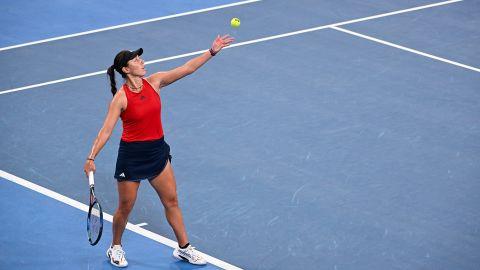Posted on January 17, 2023

CNN
—
For many, the new year offers a chance to strive to be better – at work, in relationships or to achieve one’s wildest dreams.
America’s top-ranked female tennis player Jessica Pegula looks to have received the memo.
The 28-year-old is off to a flying start in 2023, securing her first career victory over Iga Światek, beating the world No. 1 6-2 6-2 in the opening match of the United Cup semifinal in Sydney.
And with the Australian Open in full swing, there could be even more success on the way for the American, who has reached the tournament’s quarterfinals the past two years.
Eurosport expert Barbara Schett told CNN Sport: “Jess definitely has a chance to clinch her first grand slam title.
“I watched her play against Iga Światek and she really surprised me. She literally hit Iga off the court. If she can repeat this level, she can win the Australian Open.”
Who is she?
Ranked third in the world, Pegula hails from a sporting dynasty of a different kind. Her father, billionaire Terry Pegula, and mother, Kim, sit at the head of a sports empire, co-owning the NFL’s Buffalo Bills and the National Hockey League’s Buffalo Sabres.
Her father, worth around $6.7 billion, per Forbes estimates, made his fortune in oil and gas through the company, East Resources. After selling company assets, her parents bought the Sabres for $189 million in 2010 and the Bills for $1.4 billion in 2014.
“She really is something of a workhorse which I think defies a lot of stereotypes and expectations you might have with someone of her background,” Ben Rothenberg, senior editor at Raquet Magazine, told CNN Sports.
Tennis star Pegula is a huge Bills fan, often juggling tennis commitments to make time to watch games.
Outside of tennis, she owns her own skincare brand, Ready24. She also has a soft spot for furry friends and founded “A Lending Paw,” a charity that connects people with rescued and trained service animals, with her husband Taylor Gahagen.
Enough about her parents… What about her?
Pegula got her start in tennis aged seven, playing because her older sister Laura took part in the sport.
“She played tennis in juniors and college, so I was always around the tennis courts, watching her matches, watching her practice. I remember thinking to myself, ‘Oh, my God, I’m never going to be able to hit as hard or be as good as them,’” Pegula said, according to Forbes.
“But I stuck with it, and I started taking lessons after school three, four days a week, doing some of the tennis camps. That’s really how I started.”
Her journey hasn’t always been smooth, and injuries have stalled her career. A knee injury in 2014 took her off the tour for a year and a half, while a hip surgery in 2017 was the “hardest to come back from,” she told reporters.
“I didn’t even know if I wanted to come back. This was just going to be so hard,” she admitted. But then, “I think I just got over it. I was like, ‘Whatever, I’m just going to fight through it again.’”
Following her injuries and because of her unique family background, it would have been easy to assume that she would “recede from court,” according to Rothenberg.
“Unlike a lot of players, she wasn’t playing to support her parents and her family,” he explained. “But she really has shown incredible commitment, dedication and passion for tennis, pushing through all the various injuries she had, dedicating herself and playing really fully up until now.”
In addition to being the number three in singles, she is one of the busiest players on tour and “often plays a very professional double,” he added.
‘You bet against her at your own peril’
Pegula’s breakthrough finally came in 2021, where – after starting the year ranked No. 62 – she ended the season in the top 20 after five quarterfinals, a pair of semifinals and seven top-10 finishes.
“She’s just a down-to-earth, real person and she works really hard,” her coach, David Witt, said in 2021, according to the USTA. “She’s just very easy to get along with. We have fun while we’re working hard. And we’ve just clicked,” he added.
Rothenberg agrees. “There’s been a couple of years now in a row, people really thought that she was kind of maximizing above what people probably thought her ceiling was. She keeps defying the bars that have been set for her, the limits that have been set by prognosticators in the sport.
“You bet against her at your own peril, even if she is starting from increasingly strong places. And she started very, very strong,” he said.
This, he said, is shown through the dependability of her game.
“Pegula really was incredibly consistent at beating the players she’s supposed to beat at the big events, and she lived up to her seedings, she doesn’t get upset – that’s really rare and really impressive to do,” he explained.
In three of the four grand slams last year, Pegula lost in the quarterfinals to the eventual champion, beaten by now-retired Ash Barty in the Australian Open and Światek at the French Open and the US Open. Reaching this stage of the tournament, she has joked, has become her “M.O.”
“My goal the whole year was to start winning more tournaments, to keep persisting throughout the year and finally at the end of year was more rewarding,” Pegula said in a recap of 2022. This came in Guadalajara, where she secured her biggest win and trophy.
Now comes the Australian Open.
Eurosport expert Laura Robson, a former British No.1 and an Olympic silver medalist, told CNN Sports that Pegula is “definitely” one of the main contenders for the women’s title.
“She has always been an unbelievable ball striker but she’s improved her consistency and movement so much over the last year,” Robson said.
“She is hitting the ball better than ever and the win against Swiatek at the United Cup will give her a huge amount of confidence to believe that she can finally have that big breakthrough at the slams.”
“If the conditions in Melbourne are similar to they were in Sydney, I think that really suits her game. Playing really low and flat and fast is just how she likes it, and what suits her ball striking,” Rothenberg said, but added that her success could hinge on who she gets in the draw.
